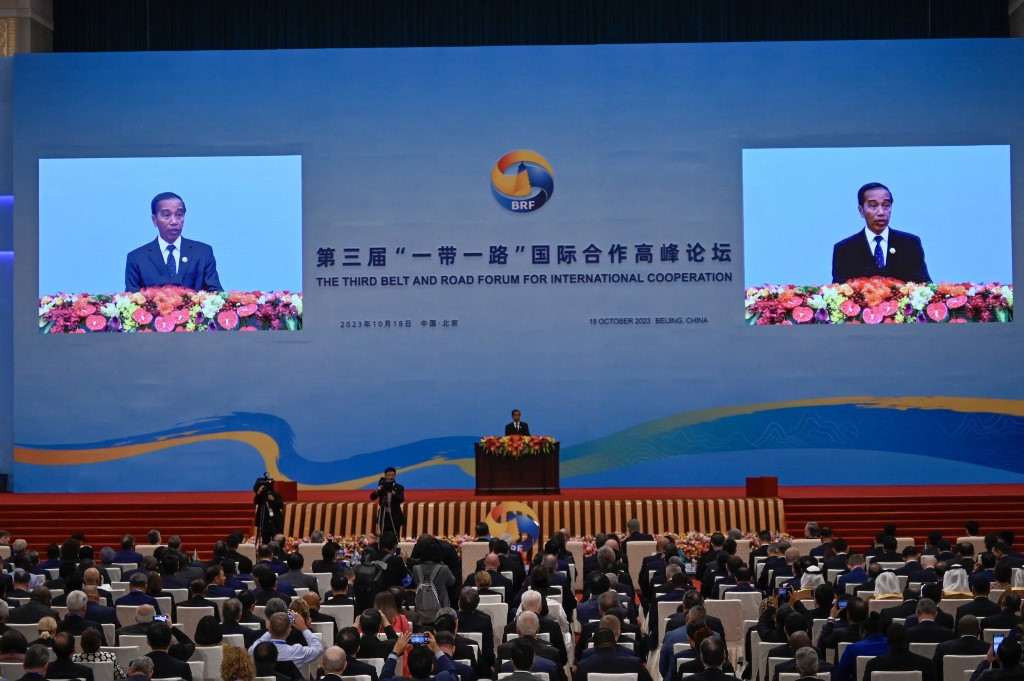Popular Reads
Top Results
Can't find what you're looking for?
View all search resultsPopular Reads
Top Results
Can't find what you're looking for?
View all search resultsChina's life-saving vaccines
Developing countries prefer to borrow from China because it simply means business and does not take elements like human rights, press freedom, and economic liberalization into account.
Change text size
Gift Premium Articles
to Anyone
T
he 10th anniversary commemoration of China's Belt and Road Initiative (BRI) in Beijing last week was more than fitting for Chinese President Xi Jinping to display the achievements of his country's massive infrastructure loans to developing countries, particularly in Asia and Africa. In his address, Xi also highlighted China's COVID-19 vaccines.
To his guests, including President Joko “Jokowi” Widodo, President Xi showed how the BRI became a life-saving scheme for many countries, especially during the COVID-19 pandemic. China provided more than 10 billion masks and 2.3 billion doses of vaccines to other countries, including BRI partners, and jointly produced vaccines with over 20 of them. The vaccines contributed much to the fight against COVID-19 in the countries, even the world.
After about three years the pandemic has been declared over. Many people, including Indonesians, have probably forgotten how the Chinese vaccines came very early, just as the pandemic was rearing its ugly head.
Xi acknowledged that China also received valuable support from more than 70 countries when it was hit hard by the pandemic. "We have learned that win-win cooperation is the sure way to success in launching major initiatives that benefit all," Xi said.
Thanks to China, Indonesia could vaccinate millions of people, especially the high-risk groups, timely. Back then many cast doubt over the effectiveness of the vaccines. That President Jokowi was among the first to receive the COVID-19 jab was aimed at building public trust in the Chinese vaccines.
We cannot imagine what would have happened had China refused to share its vaccines with developing countries and followed the footsteps of certain industrialized nations that lent a hand only while their vaccine stocks were sufficient. China deserves our respect and gratitude for its vaccine policy.
President Xi has the right to claim that over the last 10 years, China has contributed to the global network of connectivity "consisting of economic corridors, international transportation routes and information highway as well as railways, roads, airports, ports, pipelines and power grids".
China has become a magnet for development assistance-seeking nations since 2013, after it agreed to pour billions of US dollars into building infrastructure in developing countries. China has gradually taken over the dominant role of Western countries and Japan and their controlled financial institutions, such as the World Bank and the Asian Development Bank (ADB).
President Xi is now pushing to make the BRI smaller and greener and to move from big-ticket projects like dams to high-tech ones such as digital finance and e-commerce platforms. BRI will also focus more on issues like peace, climate change, energy crises and artificial intelligence (AI), among many other areas, according to a Chinese government white paper released last week.
Developing countries prefer to borrow from China because it simply means business and does not take elements like human rights, press freedom and economic liberalization into account, unlike the dictating lenders such as the United States, European Union and Japan. Many of the loans from the latter eventually served the interest of the money lender than the borrower.
China has built infrastructure like roads, railways and ports, which are direly needed by poor countries. We cannot, however, turn a blind eye to the problems with infrastructure loans, as quite often both the lender and borrowers have ignored the importance of comprehensive feasibility studies prior to the infrastructure projects.
They also sometimes forgot to prepare a complete legal framework for the cooperation, including the financial schemes, before they started the work. Such negligence has often ended in disputes or misunderstandings for both sides.
Worse, in some cases, the China-funded projects have resulted in a "debt trap". This happens when loan recipients cannot service their debts. It has become a serious problem now for China and its debtors.
On the problematic projects, both China and the borrowers should work together to find solutions that please both parties and especially the people as the beneficiaries of the projects.











